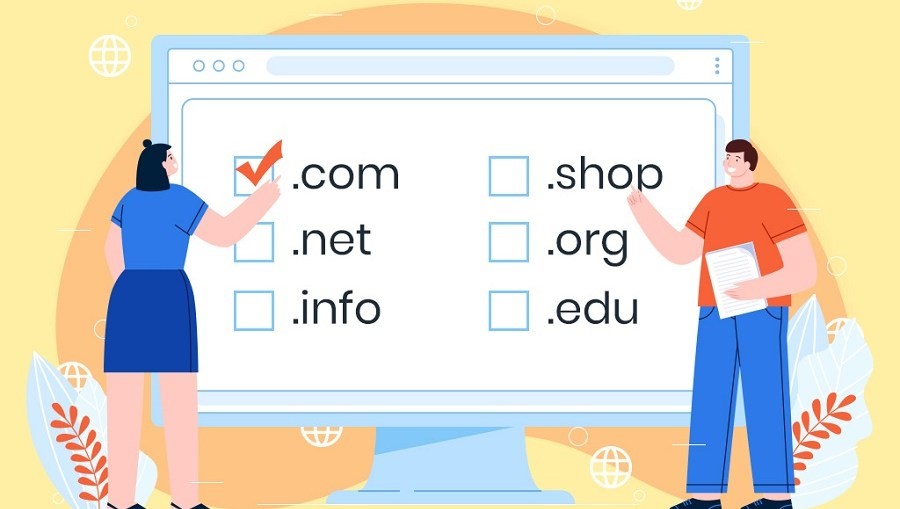You may have observed that domain names end with extensions such as ‘.com’, ‘.biz’, ‘.org’, ‘.edu’ etc.
These extensions are known as Top Level Domain names or TLDs. Before buying a cheap domain in the UK or anywhere else, it's crucial to understand what TLDs are and how the correct (or wrong) one might affect your site.

Top-Level Domains (TLDs): A Quick Overview
Rather than picking the first TLD that appeals to you, you should give it some thought.
Some TLDs, for example, have specific meanings or connotations, whilst others may be confusing to your visitors. When deciding on a TLD for your website, keep these factors in mind.
We'll go over what TLDs are and why they're important for your website in further detail in this post. We'll also go over some of the most important variables to consider before making your decision.
Let’s get into this!
The Top-Level Domain (TLD) is the part of a URL that comes after the dot — for example,.com or.org. When you get a cheap domain in UK, your domain registrar would provide you with options of numerous TLDs to choose from.
Several unique TLDs were created in the 1980s (.com, .edu, .gov, .int, .mil, .net, and .org). There are still certain limitations on some of them.
For example, the.gov TLD is restricted for government entities. Similarly, you can’t get a ‘.edu’ domain unless you prove that the website is of a registered educational institute.
More TLDs, including ‘.biz’, were introduced in the early 2000s. There are now even more choices, ranging from ‘.nyc’ to ‘.bargains’, as well as country code TLDs such as ‘.pk’, ‘.uk’, etc.
The majority of them are generic top-level domains (gTLDs), meaning anybody may register them.
Why Is It Critical to Carefully Select Your Site's TLD?
It's critical to think about the TLD you'll use before buying a cheap domain in UK. It's tough to modify a domain name once it's been assigned to your website.
Furthermore, the TLD of your website is critical for people to remember your URL.
For example, the a.com ending is simpler to remember than. rocks or even.net since it is so prevalent. Their expectations of your site are also shaped by your TLD. .org, for example is still associated with NGOs.
In terms of Search Engine Optimization (SEO), all TLDs are virtually the same. Local SEO, in certain circumstances, is the lone exception. If your target market is predominantly located within a certain country, a ccTLD might help you appear in local searches.
Three Tips to Choose the Right TLD for Your Website
Fortunately, deciding on the correct TLD for your website isn't difficult. All you have to do is remember the three suggestions below.
1. Keep in Mind the Goal of Your Website
Because certain TLDs serve distinct objectives, you should think about the sort of website you're creating. NGOs, for example, are typically better suited with a.org TLD, despite the prevalent misconception that the.org TLD is exclusively accessible for nonprofits.
People are more likely to take NGOs seriously if they have an 'official'.org domain, even if this isn't true.
However, certain TLDs are constrained by their intended use.
If your primary audience is located outside of the United States, you should consider a local ccTLD for SEO purposes. This does not apply to city or regional TLDs like. nyc or. london. Some ccTLDs may also be blocked based on the location of your server.
2. Keep It Short and Simple
Some of the newest TLDs, such as.biz for enterprises and. jewelry for jewelers appears to be interesting. The majority of people, though, still associate.com with websites.
They're likely to key in.com regardless of your TLD, which might lead to them never finding your site.
As a result, if the name for your Cheap Domain in the UK or anywhere you desire is already used, it's recommended not to use something other than.com. It's best to come up with a new domain to utilize with.com rather than just change the ending.
There are several approaches to coming up with a memorable domain name.
Using.com may also prevent users from accessing the.com URL and arriving on another website (perhaps a competitor's). Of course,.com may or may not be the perfect TLD for your website, depending on its purpose.
3. Consider Buying a Few Different TLDs
Each TLD can only have one name for your domain or specifically your Cheap Domain in the UK, so mywebsite.com and mywebsite.net can both exist. This implies that unless you acquire it first, a rival might buy an alternate TLD for your website and redirect it to their own.
Some companies buy numerous TLDs in order to prevent others from stealing their traffic.
You may have noticed that Google has purchased multiple top-level domains (TLDs) such as google.com, google.org, and google.net. Both facebook.biz and facebook.info point to facebook.com:
You don't have to buy every single TLD available unless you're Google. You should, however, have a few crucial choices on hand (if your budget allows).
The.com TLD is the most vital to have.
It's a good idea to acquire the.com ending as a domain/Cheap Domain in the UK redirect if your website has another TLD. Users will still end up on your site if they unintentionally key in the erroneous URL. Additionally, you will have more flexibility in selecting the principal TLD for your website.
TLDs have the most influence on how people perceive your website. Don't overlook the impact of public perception, though. Choosing the wrong TLD for your website might make it appear amateurish.
If potential visitors misremember your TLD, they may end up on a whole other website so be cautious when getting cheap domain registration in UK.
A top-level domain is an important aspect of the structure of your website.
Take the time to research the many TLD alternatives and choose the best one to represent your company online before you buy one.
You can modify your TLD or domain name later if necessary. However, you'll need to 301 redirect the old domain and all pages to the new one, and your traffic may take up to six months to recover.
It's far easier to get your website off to a good start than it is to go through a site migration, which will stymie your bottom line and SEO content marketing efforts.
If you’re operating a business in UK, don’t forget to register your domain with a ‘.co.uk’ extension even if you’d be using ‘.com’ for your website. This will help keep your brand safe and no other business would be able to register their domain with your brand name.
21 Jun 2022
 GBP (£)
GBP (£)
 USD ($)
USD ($)







